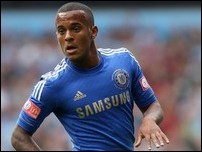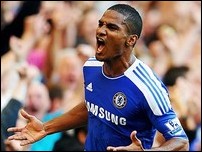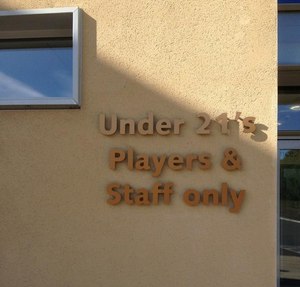Plains Of Almería"Tell them Osgood is not forgotten on the plains of Almería." 1971, Raquel Welch.The AVB Project: Over before it began Turbulent, unpredictable and chaotic, Andre Villas-Boas’ eight-month reign at Stamford Bridge will go down in the history books as anything but uneventful. What started as something so promising, heralded as the beginning of a new era in SW6, ended with the eventual European Champions looking like a shadow of their actual selves; dishevelled, demoralised and depressed.
Heartless defeats at Everton and West Brom in February and early March were indicative of the shambles the team had become on the field, while behind the scenes the us-against-the-world mentality that Villas-Boas had attempted to foster had morphed into a me-against-them battle. It is difficult to pinpoint precisely when the roof came in on AVB’s ‘project’, more likely it was a trickle of poor management and bad decisions that brought about the eventual collapse of a side that had won the league and Cup Double just a year before he arrived in town, and would go on to be crowned Kings of Europe just eleven weeks after he had left.
It all seemed to start so well. Back in August, in swept a suave, confident 33-year-old with a plan to rebuild the team and create a legacy that would last much longer than the customary couple of years most of Roman Abramovich’s managers enjoyed. Villas-Boas might not have made grand statements like José Mourinho, however he did appear to be a young man in control and steadfastly sure of how he was about to approach his toughest career task to date.
Talk of unearthing an additional 10% out of the current squad, of evolution rather than revolution, was welcomed. His success at Porto was evidence that his footballing philosophy had substance, and the early signings of Oriol Romeu, Raul Meireles and Juan Mata galvanised much enthusiasm on the terraces. It is wrong to suggest that the Chelsea fans never warmed to Villas-Boas; on the contrary, there was much evidence that the supporters were prepared to give him and his project more time than any manager in recent history had received.
Evidence of this support was at Old Trafford in mid-September, when the Blues went down 3-1 for their first defeat of the Portuguese’s reign. The manner of the defeat had roused the fans, they out-sung their Mancunian rivals as the final whistle approached and as they poured out into the late autumn evening there was real hope and belief that the building blocks of something special were being tentatively put together, despite the loss. There was no demand for overnight success, there was an appreciation that this rebuilding might take some time, but there was a clear sign that day in Manchester that AVB’s grand plan had the backing of the club’s supporters.
The positivity continued all the way through to mid-October, where a 3-1 home victory over Everton put the Blues third, just three points back on leaders Manchester City. The team had responded to that reverse at United with three successive league wins, although the first cracks were beginning to emerge.
The manager’s treatment of Frank Lampard appeared, even initially, rather disconcerting. At 33, many appreciated that Lampard was no longer that midfield mainstay who could clock up 100+ consecutive league appearances and there was a general understanding that he would have to be slowly phased out over the coming two or three seasons. However, the all-or-nothing approach taken by Villas-Boas was to be one of the biggest misjudgements of his reign.
There is little doubt that Lampard was struggling to adapt to the fast-paced midfield that Villas-Boas was attempting to adopt and his performances through much of the autumn and winter hardly warranted a continued first team place. The war of words that ensued in the media, through various ‘sources’ close to the player, antagonised the fraught situation further, until manager and vice-captain seemed positively at loggerheads with one another.
How Villas-Boas might have managed the situation better has been the subject of much talk and debate. Lampard clearly could no longer perform for ninety minutes every three or four days, and so the manager’s careful use of the midfielder seemed reasonable, even if it was difficult for the fans to see less and less of one of the club’s greatest ever players. When he was involved he was largely anonymous, squeezed out of the game by Villas-Boas’ defensive high line and caught struggling with the pace of the game in midfield.
But rather than seek to understand his player and address his issues, the manager seemed to see Lampard’s struggles as the perfect opportunity to speed up his demise. The familiar complaints of player power at the club resurfaced, with the manager appearing to want to use his authority as chief rebuilder to finally end the unhealthy control and influence that certain factions of the dressing room seemed to enjoy. Lampard felt undervalued and mistreated, and was not backward in coming forward to express his growing frustrations and doubts over the new young boss.
The standoff would play out right up to Villas-Boas’ exit in March, and it is only really with the final three months of the campaign under Roberto Di Matteo in mind that the clearest picture of the feud can be seen. Lampard was managed much more cleverly by the Italian interim boss and, even though he featured in only four of the last eight games of the campaign, not only did he still feel like an important member of the first team squad, he was an important player in the first team squad, ending the season the club’s top goalscorer once again, with 16 goals.
He accepted his deeper midfield role with minimal fuss and maximum effect, proving to be invaluable as he captained the side to European Cup success in Munich. Di Matteo, unlike Villas-Boas, not only understood what made Frank Lampard tick, but also what made him still such an important member of the side.
Mid-October might well have been Villas-Boas’ high point as Chelsea boss because, from there, it all seemed to fall apart rather quickly. Defeats to Queens Park Rangers and Arsenal at the end of the month, to Liverpool twice in November, and to Villa in December, as well as consecutive 1-1 draws against Wigan, Tottenham and Fulham in the last month of the year left the Blues 5th and a hefty eleven points back on City and United at the start of 2012.
Doubts about the manager’s tactical astuteness were widespread; his defensive high line was maligned equally by players, supporters and pundits, and was eventually ditched rather unceremoniously in the make-or-break Champions League group win over Valencia. Some said that the players had forced through this change of style, somewhat against the manager’s wishes, though it continued six days later in the 2-1 home win over Manchester City. If that it true it represents an early nail in the young boss’ Spring coffin.
January saw the culmination of two acrimonious player-manager disputes, with the exits of Nicolas Anelka and Alex from the club. Both had limited opportunities under Villas-Boas, which brought about an inevitable frustration, though the manager’s banishment of them from the first team car park at Cobham and to training with the reserves was unnecessary and potentially harmful to first team fortunes. Both players had demonstrated their worth to the club over respective four-and-a-half and four-year spells. It seemed like petty point scoring at the time, and can have done little good for team morale either.
There was one notable bit of good business done in January and that was the signing of Bolton Wanderers’ Gary Cahill to replace the departed Alex. Cahill, despite a few initial reservations, turned out to be an inspired signing though, once again, there is doubt over how much credit for this the manager can actually take. As he himself was constantly at pains to stress, the signings were made by those above him and, rumour has it, it was actually Stoke’s Ryan Shawcross Villas-Boas wanted anyway. However, the press seemed to approve the signing of a young Englishman, though it was to be one of the few areas Villas-Boas was commended by the media.
His relationship with the press was terse and unwilling from the start; whereas our former Portuguese boss had revelled in the bear’s pit that was a weekly press conference, Villas-Boas clearly did not enjoy these regular jousts with the hacks. He was quickly labelled ‘Mr Chippy’ for his bristling nature with journalists and took the brave, and perhaps most unwise, step to take on the powerful establishment.
It was another aspect of his us-against-the-world mentality, an approach he had seen work so well during his previous spell at the club under Mourinho. But arrogance and spikiness are only tolerated by the hacks when things are going well; at the first sign of weakness, they capitalised. As evidenced by their admiration of one Harry Redknapp, the press can attempt to kick-start or kill careers based solely on whether they like someone or not. They didn’t like Villas-Boas, nor he them, and the mutual loathing only helped to speed up his demise once the tide began to turn against him.
On the field January was a solid enough month for the Blues, with 6 games undefeated and progress to the 5th Round of the FA Cup, though league points were rather disappointingly dropped at Norwich and Swansea. The latter was a pretty dismal performance in South Wales on a chilly Tuesday night, and began a run of five games without a win that would ultimately result in Villas-Boas teetering on the brink.
It was only Jose Bosingwa’s deflected effort in the third minute of stoppage time that salvaged a point at the Liberty Stadium and, perhaps in hindsight, we can say this is the moment the wheels really started to come off. Surrendering a three-nil lead over Manchester United at the Bridge followed, before arguably the most disappointing and disheartening defeat of the manager’s tenure at Goodison Park. The players seemed disinterested and were outplayed throughout, the manager appeared clueless and the growing discontent from the away fans grew ever louder. ‘You don’t know what you’re doing’, they sang and, increasingly, it seemed like Villas-Boas didn’t.
The Fernando Torres conundrum was also one that increasingly became a bigger and bigger headache for the manager throughout the winter and into spring. It would be callous to blame Villas-Boas for the Spaniard’s failures in front of goal, though his hard-love approach to coaxing the best out of his £50m striker seemed disharmonious with Torres’ character. An arm around the shoulder would have been more appropriate, as opposed to long spells on the bench before being called upon to cover in Didier Drogba’s long absences. While even Di Matteo has struggled to really get Fernando firing again, it must be said that Villas-Boas’ stony man-management approach was always destined to fail with his players, Torres’ ilk in particular.
Another uninspiring display, this time in a home FA Cup tie against Birmingham, was followed by perhaps the most pivotal moment; the trip to Naples in the Champions League last-16. This was a turning point in the whole season, though not in a good way for Villas-Boas. The manager left Ashley Cole and Lampard on the bench, while Terry was absent altogether with injury, and a 3-1 defeat left the Blues on the brink of European exit, and Villas-Boas on the brink of an exit of his own.
In fact, he was to hold on for another fortnight, with the reverse at West Brom proving to be his final downfall. It is impossible to pinpoint precisely where and why the Villas-Boas project fell apart; a good young coach with plenty of ideas and a European trophy under his arms who lasted not even a year into the job. Undoubtedly the growing rap sheet against him indicates his shortcomings but, quite possibly, it was a case of the right man at the wrong time or maybe even the right mantra to the wrong man.
Di Matteo proved what could be done with the exact same group of players, though perhaps his fixation on the short-term contrasted to the brief given to his predecessor. If Villas-Boas could be accused of being too long-termist, Di Matteo could certainly be charged with being overly short-termist, though not many would complain about that and this, as in the opposite sense with AVB, was the Italian’s brief. With a two-year contract as permanent manager now signed and sealed, it will be interesting to see how Di Matteo copes with phasing some of the veterans out of regular first team action and rebuilding the team.
As Villas-Boas prepares to replace Harry Redknapp as manager of Tottenham Hotspur, there is much mocking and hilarity from Chelsea contingents, though there is every chance that this will provide a less ruthless, more welcoming and understanding environment for the kind of project that Villas-Boas wishes to lead. Fewer big egos, a more emphasised attack on the wings and a slightly quicker defence might just be a better set of foundations for the project than he found on arrival in West London. Perhaps White Hart Lane will be the location at which Villas-Boas does the job he intended to do twelve months previously across town at Stamford Bridge.
Though for a final word it is apt to turn to the man himself, who declared on arrival in SW6, ‘I would be surprised to be kept on the job if I don’t win, it’s as straightforward as that.’
And so it came to pass.
http://plainsofalmeria.co.uk/2012/07/03 ... /#more-379Хорошая статья о короткой эре АВБ в Челси. Всё правильно написано, не потянули его его хрупкие плечи тяжёлую ношу, потерял раздевалку и был слит игроками, а потом и хозяином. Ну и замечательный эпиграф от прекрасной Ракель Уэлч. Настоятельно рекомендую почитать.






